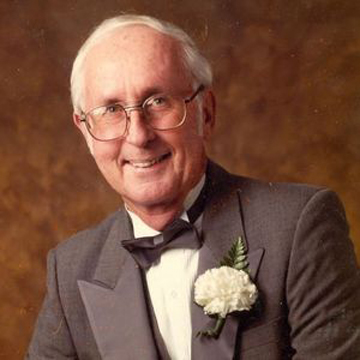In Memoriam: Hal McPherson Butler
1929-2014
by David Simpson and Howard Dickson

Hal McPherson Butler, Jr., age 84, of Kingston, Tennessee, passed away peacefully at home surrounded by his family on 30 June 2014. Hal was a Health Physics Society member for 50 years, from 1959 until 2009, and was a member of the East Tennessee Chapter. He was a 55-year member of First Baptist Church of Kingston. He received his BS degree in engineering physics from the University of Chattanooga and was an Atomic Energy Commission fellow in radiological physics at Vanderbilt University. He served in the U.S. Army during the Korean War. Hal was an employee of Oak Ridge National Laboratory (ORNL) for 34 years, retiring as director of the office of radiation protection. His favorite hobby was golfing with friends.
Hal was preceded in death by his parents, Hal and Addie Butler; brother, Charles Butler; and sisters, Gaynell Wheeler and Mary Welch. He is survived by his wife of 64 years, Mildred Smith Butler; daughters, Karen Pentecost (Don) of Memphis, Tennessee, and Kristi Parks (Russ) of Duncansville, Pennsylvania; grandsons, Dr. Will Pentecost of Seattle, Washington, David Pentecost (Megan) and Roy Pentecost of Memphis, Tennessee, and Joe and Matt Parks of Duncansville, Pennsylvania; granddaughters, Rachel and Rebecca Parks of Duncansville, Pennsylvania; great grandsons, Theo and Jasper Pentecost; brother, Delbert Butler (Jackie) of Hixson, Tennessee; and many nieces and nephews.
David Simpson remembers Hal: One of the great advantages of working as a young health physicist at ORNL was the number of outstanding mentors available to help shape my future career. I recently learned of the passing of Hal Butler, who was certainly an individual who filled that role in my life. What I remember most about Hal was his quiet but steady, thoughtful, and sure leadership of the Health Physics Department at ORNL. He was always ready to support and encourage me as a young and upcoming health physicist and willing to patiently listen to any issues that I had, no matter how trivial they were. I must admit that one of the hardest things I have had to do was turn in my resignation to Hal when I felt that I had a better opportunity—his able supervision was a major part of what made that decision difficult.
Howard Dickson remembers Hal: The first time I met Hal Butler was in 1965. I was an Atomic Energy Commission fellowship student at the University of Tennessee and serving my summer internship at ORNL. Hal provided us students with an excellent introduction to the practice of applied health physics. I still remember his exceptional explanation of how the big accelerators at ORNL worked, what the radiation hazards were, and how health physicists controlled those hazards.
Several years later as my career progressed, I was honored to manage the Health Physics Department at ORNL and Hal worked for me as a section chief. Hal ran his section to perfection. His subordinates loved to work with him and learn from him. The result was a fine-tuned radiation protection program at all the facilities where Hal was the cognizant health physicist.
Hal was a dedicated professional and soft-spoken advocate for radiation safety his entire career. It grieves me to lose such a talented person and kind-hearted personal friend.




